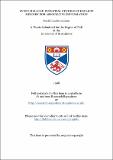Files in this item
Event-related potential studies of explicit memory for associative information
Item metadata
| dc.contributor.advisor | Rugg, M. D. (Michael D.) | |
| dc.contributor.author | Donaldson, David Ian | |
| dc.coverage.spatial | 291 p. | en_US |
| dc.date.accessioned | 2018-06-28T09:27:17Z | |
| dc.date.available | 2018-06-28T09:27:17Z | |
| dc.date.issued | 1998 | |
| dc.identifier.uri | https://hdl.handle.net/10023/14689 | |
| dc.description.abstract | Previous studies employing event related potentials (ERPs) have investigated the neural correlates of explicit memory using item recognition and source memory tests. These studies suggest that recollection, the retrieval of information about specific prior study episodes, is associated with two temporally and topographically dissociable ERP old/new effects. First, the 'left parietal' effect (found in studies of item and source memory) which provides an index of the retrieval processes supporting recollection. Second, the 'right frontal' effect (found in studies of source memory) which is thought to be associated with more strategic task-related 'post-retrieval' memory processes. In the present thesis the ERP old/new effects were investigated in five experiments using tests of explicit memory for associative information. In each experiment subjects studied novel word pairs, and memory for these associations was assessed using associative recognition and associative recall tasks. Consistent with previous behavioural studies that suggest associative recognition is dependent upon recollection, performance on this task was associated with both the left parietal and right frontal old/new effects. Moreover, successful associative recall was associated with equivalent old/new effects, contrary to previous findings that suggest performance on this task is associated with the left parietal but not the right frontal old/new effect. Whilst the findings support the previous functional account of the left parietal old/new effect, they necessitate the refinement of the account of the right frontal old/new effect. Significantly, the ERP findings suggest that the right frontal old/new effect can be dissociated from an early bilaterally-distributed frontal old/new effect that cannot be accounted for in terms of strategic post-retrieval processing. Finally, an alternative account of the frontal effects is proposed, drawing on evidence from neuroimaging studies, and distinguishing between pre- and post-retrieval support processes. | en_US |
| dc.language.iso | en | en_US |
| dc.publisher | University of St Andrews | |
| dc.subject.lcc | QP406.D8 | |
| dc.subject.lcsh | Memory | en |
| dc.title | Event-related potential studies of explicit memory for associative information | en_US |
| dc.type | Thesis | en_US |
| dc.type.qualificationlevel | Doctoral | en_US |
| dc.type.qualificationname | PhD Doctor of Philosophy | en_US |
| dc.publisher.institution | The University of St Andrews | en_US |
This item appears in the following Collection(s)
Items in the St Andrews Research Repository are protected by copyright, with all rights reserved, unless otherwise indicated.

